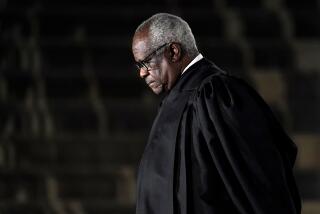Ginsburg Stands by Involvement With Group
- Share via
WASHINGTON — Supreme Court Justice Ruth Bader Ginsburg on Friday defended her involvement with the liberal NOW Legal Defense and Education Fund, and said justices should not “lightly recuse” themselves over possible conflicts of interest.
Responding to questions from law students at the University of Connecticut in Hartford, Ginsburg said she did not see a problem in her lending her name and presence to an annual lecture series that the fund co-sponsors with the Assn. of the Bar of the City of New York.
In a Los Angeles Times article this week, some legal experts said Ginsburg should not be affiliated with the legal defense fund because it often is involved in cases before the Supreme Court.
In January, for instance, Ginsburg took the side of the legal defense fund in a medical screening case. Two weeks later, the justice made her latest speaking appearance for the lecture series.
Ginsburg said Friday that the lecture series “is not a money-making enterprise.”
“I think and thought and still think it’s a lovely thing. Let the lecture speak for itself,” she said.
The issue of connections between justices and individuals or groups with cases before the court arose when Justice Antonin Scalia went duck hunting in early January with Vice President Dick Cheney, shortly after the justices agreed to hear Cheney’s appeal involving his energy policy task force. Cheney’s case is to be argued before the court April 27.
Lawyers for the Sierra Club have urged Scalia to step aside, and if he refuses, they want the full court to force him out. The recusal issue is likely to come before the justices this month.
In her comments Friday, Ginsburg said recusals are frowned upon by the justices.
“In the end, it’s a decision the individual justice makes, but always with consultation among the rest of us,” she said.
She said the high court is unique because the justices cannot be replaced by outsiders.
“On the Supreme Court, if one of us is out, that means there are only eight,” she said. “There is a risk we will not be able to decide the case -- that it will be divided evenly. Some of my colleagues think a recusal in the Supreme Court is equivalent to a vote against the petitioner.”
She did not cite an example. But if Scalia were to recuse himself from the Cheney case and the court were to split 4-4, the vice president would lose, and he would be obliged to turn over documents detailing who advised his energy task force.
“There is no one to replace us,” she said. “It makes it quite important that we not lightly recuse ourselves.”
By contrast, trial judges and appellate judges are “replaceable,” she said. If a judge sees a need to step aside because of a possible conflict, another judge can step in.
Referring to her earlier years on the U.S. court of appeals, Ginsburg said, “if there was any doubt, I would say, ‘I’ll skip this one.’ ”
She said, however, that the recusal rules are strict when Supreme Court justices have a financial stake in the outcome of a case. “If I owned one share of General Motors, I couldn’t sit on that case,” she said.
She also said four justices who have a spouse or a child who practices law have a formal agreement that they will not step aside simply because their relative’s law firm is involved in a case.
Ginsburg said that recent articles in the Los Angeles Times about Scalia as well as herself have focused on “the appearance of impartiality.”
“I don’t know where all this is going to lead,” she said.
Noting that the first articles were about Scalia, her conservative colleague, Ginsburg described those stories as “on one side of the political spectrum.”
The story about her relationship with the NOW legal defense fund came later, she said, because “the L.A. Times wanted to give equal treatment” to a liberal justice like herself.
More to Read
Get the L.A. Times Politics newsletter
Deeply reported insights into legislation, politics and policy from Sacramento, Washington and beyond. In your inbox twice per week.
You may occasionally receive promotional content from the Los Angeles Times.












